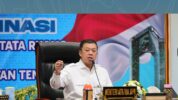Amnesty International Warns of Rising Authoritarianism in Indonesia and Globally
The revised Electronic Information and Transactions (ITE) Law remains a key tool in suppressing dissent. Amnesty recorded 15 prosecutions under the ITE Law in 2024 alone. Among those charged were a civil servant and a university student, both detained for online posts critical of government officials. Activists and critics continue to face harassment despite legal protections.
Security forces have also escalated violence against peaceful protesters. During protests in August 2024, at least 579 people were injured due to police crackdowns. More recently, student demonstrations in March 2025 opposing proposed changes to military laws led to 221 injuries, with allegations of excessive force widely reported.
Human rights defenders and journalists remain under threat. Amnesty documented 123 attacks on journalists, activists, and indigenous leaders last year, including arrests, threats, and attempted assassinations. Two journalists in Papua were assaulted in separate incidents; neither case has resulted in significant legal action.
Indonesia’s surveillance practices have also come under scrutiny. The report alleges the state used foreign spyware, including tools sourced from Israel, to monitor private citizens. Although a data protection law was passed in 2022, enforcement remains lax, leaving individuals vulnerable to privacy violations and digital repression.
Religious minorities continue to face discrimination. In 2024, there were eight documented incidents targeting groups such as the Ahmadiyya and Christian communities. These ranged from forced church closures to violent mob intimidation. Amnesty criticized local authorities for failing to uphold constitutional guarantees of religious freedom.
Major development projects were also condemned for disregarding indigenous rights. Efforts such as the relocation to the new capital city (IKN) and the Rempang Eco City project have displaced native communities without proper consultation or consent. Amnesty further criticized the government’s reliance on fossil fuels, warning that its environmental and social policies are deepening inequality.



























Tinggalkan Balasan